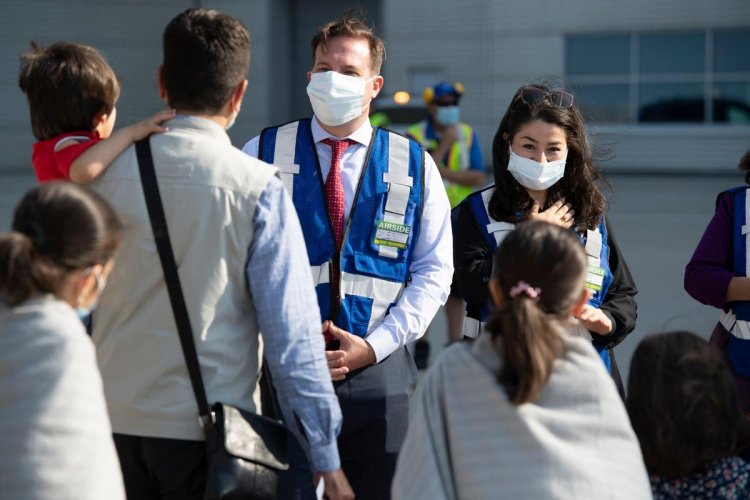Canada was urged to plan Afghan evacuation months before fall of Kabul, documents show
More than three months before Kabul fell to the Taliban, Global Affairs Canada was urging the federal government to make special immigration plans for its domestic staff in Afghanistan, according to official documents.At a meeting on May 3, 2021, GAC’s assistant deputy minister Paul Thoppil raised the issue with Immigration, Refugees and Citizenship Canada, based on the “specific threats” the domestic staff faced amid “a deteriorating security situation in Afghanistan.”“This issue has been raised since 2012 and discussed at various levels within GAC and between GAC and IRCC,” say heavily redacted briefing notes obtained by the Star under an access-to-information request.“The recent announcement of full U.S. drawdown by Sept. 11, 2021, brings new urgency.”It is unclear what came out of that meeting, but it took until almost 12 weeks later, on July 22, for then-immigration minister Marco Mendicino to sign and approve a new special program, announced the next day, to resettle the Afghans in Canada. One of the issues in the delay appeared to be the indecisiveness over the scope of the program and whether former interpreters for Canadian forces should qualify.“Lives hang in the balance, which is why we’re taking timely and decisive action,” Mendicino said in a statement then. “Canada will do right by those who did so much for us.”His announcement officially started the process, but less than a month later, Afghanistan’s capital abruptly fell to the Taliban. Thousands of Afghan applicants to Canada didn’t get out in time.The U.S. government and the Taliban had struck a deal in 2020 providing for an end to their hostilities and a full NATO withdrawal the next year. Starting in May 2021, the Taliban began a major offensive, advancing as western forces withdrew, and Afghans who aided western governments were considered in danger of recrimination.Before Mendicino’s announcement, the Trudeau government had been criticized for not having a plan to help Afghan interpreters and other civilians who worked for Canada, while its U.S. and coalition allies had been getting their local staff out of the country.Wendy Long, founder of Afghan Canadian Interpreters, says she and others advocated for years to have a proper program to resettle at-risk Afghans but successive governments did not see the urgency.“We had nothing, absolutely nothing, even though we had been in communication … passing information along to all of the different entities — IRCC, GAC and DND (Department of National Defence). They didn’t announce anything until July 23. By then, it’s too late,” Long told the Star.A Star request for briefing reports on the Afghan evacuation and resettlement efforts got a 46-page response, though 20 pages were blacked out. Notes from a June 17, 2021 meeting between IRCC and GAC said immigration officials had drafted an approval memo and a public policy for the resettlement and that an “internal review” was underway.During the meeting, eligibility for resettlement in Canada was set based on a list provided by the head of the diplomatic mission in Afghanistan. The measures, it said, would only apply to local staff, their family and “de facto dependents.”Immigration officials also instructed the mission to distribute permanent-residence application forms and related documents so the department could be ready to launch the public policy. “This does not constitute an application, just preparation,” the briefing note said.On June 18, 2021, another note said the Afghans would only travel to Canada if the embassy was ordered to close or evacuate, while officials started preparing for a second scenario in which the embassy remained open but faced ongoing security risks amid calls to resettle local staff.The United Kingdom had already launched a plan by April to bring over current and former local Afghan staff, followed by similar efforts by other European countries. In mid-July, the White House, in addition to its special visa program for former Afghan staff, also unveiled Operation Allies Refuge to airlift at-risk Afghans. Long noted Germans had a similar special visa program and “just expanded that program, realizing the situation in Afghanistan was deteriorating.”In Ottawa, an update on July 12 said that the approval memo and yet-announced special policy were “routing” to Mendicino’s office, which appeared to be still undecided about the scope of the program.The update cautioned that interpreters were not included in the public policy “due to the complexity of defining the parameters” of such a measure. Canadian political parties were, meanwhile, gearing up in anticipation of a snap federal election ultimately called by Prime Minister Justin Trudeau on Aug. 15, the day Kabul fell.“When people are actively campaigning, technically their offices are in a caretaker’s mode. The speed of being able to react to situations or to implement policy changes is restricted,” said Long.“We could’ve averted it being a complete crisis, had we acted e


More than three months before Kabul fell to the Taliban, Global Affairs Canada was urging the federal government to make special immigration plans for its domestic staff in Afghanistan, according to official documents.
At a meeting on May 3, 2021, GAC’s assistant deputy minister Paul Thoppil raised the issue with Immigration, Refugees and Citizenship Canada, based on the “specific threats” the domestic staff faced amid “a deteriorating security situation in Afghanistan.”
“This issue has been raised since 2012 and discussed at various levels within GAC and between GAC and IRCC,” say heavily redacted briefing notes obtained by the Star under an access-to-information request.
“The recent announcement of full U.S. drawdown by Sept. 11, 2021, brings new urgency.”
It is unclear what came out of that meeting, but it took until almost 12 weeks later, on July 22, for then-immigration minister Marco Mendicino to sign and approve a new special program, announced the next day, to resettle the Afghans in Canada. One of the issues in the delay appeared to be the indecisiveness over the scope of the program and whether former interpreters for Canadian forces should qualify.
“Lives hang in the balance, which is why we’re taking timely and decisive action,” Mendicino said in a statement then. “Canada will do right by those who did so much for us.”
His announcement officially started the process, but less than a month later, Afghanistan’s capital abruptly fell to the Taliban. Thousands of Afghan applicants to Canada didn’t get out in time.
The U.S. government and the Taliban had struck a deal in 2020 providing for an end to their hostilities and a full NATO withdrawal the next year. Starting in May 2021, the Taliban began a major offensive, advancing as western forces withdrew, and Afghans who aided western governments were considered in danger of recrimination.
Before Mendicino’s announcement, the Trudeau government had been criticized for not having a plan to help Afghan interpreters and other civilians who worked for Canada, while its U.S. and coalition allies had been getting their local staff out of the country.
Wendy Long, founder of Afghan Canadian Interpreters, says she and others advocated for years to have a proper program to resettle at-risk Afghans but successive governments did not see the urgency.
“We had nothing, absolutely nothing, even though we had been in communication … passing information along to all of the different entities — IRCC, GAC and DND (Department of National Defence). They didn’t announce anything until July 23. By then, it’s too late,” Long told the Star.
A Star request for briefing reports on the Afghan evacuation and resettlement efforts got a 46-page response, though 20 pages were blacked out.
Notes from a June 17, 2021 meeting between IRCC and GAC said immigration officials had drafted an approval memo and a public policy for the resettlement and that an “internal review” was underway.
During the meeting, eligibility for resettlement in Canada was set based on a list provided by the head of the diplomatic mission in Afghanistan. The measures, it said, would only apply to local staff, their family and “de facto dependents.”
Immigration officials also instructed the mission to distribute permanent-residence application forms and related documents so the department could be ready to launch the public policy. “This does not constitute an application, just preparation,” the briefing note said.
On June 18, 2021, another note said the Afghans would only travel to Canada if the embassy was ordered to close or evacuate, while officials started preparing for a second scenario in which the embassy remained open but faced ongoing security risks amid calls to resettle local staff.
The United Kingdom had already launched a plan by April to bring over current and former local Afghan staff, followed by similar efforts by other European countries. In mid-July, the White House, in addition to its special visa program for former Afghan staff, also unveiled Operation Allies Refuge to airlift at-risk Afghans.
Long noted Germans had a similar special visa program and “just expanded that program, realizing the situation in Afghanistan was deteriorating.”
In Ottawa, an update on July 12 said that the approval memo and yet-announced special policy were “routing” to Mendicino’s office, which appeared to be still undecided about the scope of the program.
The update cautioned that interpreters were not included in the public policy “due to the complexity of defining the parameters” of such a measure.
Canadian political parties were, meanwhile, gearing up in anticipation of a snap federal election ultimately called by Prime Minister Justin Trudeau on Aug. 15, the day Kabul fell.
“When people are actively campaigning, technically their offices are in a caretaker’s mode. The speed of being able to react to situations or to implement policy changes is restricted,” said Long.
“We could’ve averted it being a complete crisis, had we acted earlier.”
An immigration operational update issued on July 23 said Mendicino finally approved the two special measures — for local staff and those with “enduring and significant relationship” with Canada, e.g. interpreters, drivers, contractors and cooks — but added that the timing of their departure was subject to GAC and DND operational requirements.
“Now that public announcement has been made, IRCC will begin contacting clients to obtain applications,” it said in the July 23, 2021 update.
Another update on July 26 warned, “Given that the security situation is quickly deteriorating on the ground, the window for departures from Afghanistan of applicants is by Aug. 23, 2021, with potentially a first cohort leaving as early as Aug. 1, 2021.”
The first planeload of Afghan refugees would not arrive in Canada until Aug. 4. On Aug. 13, the Liberal government announced a plan to bring 20,000 vulnerable Afghans — a number it later doubled — to the country.
On Aug. 15, militants waving Taliban flags entered Kabul and embattled president Ashraf Ghani fled the country. Afghan applicants to Canada who weren’t out by then found there was no Canadian embassy to take or process applications, and Taliban checkpoints made it difficult to escape.
“Justin Trudeau and Minister Mendicino both owe these Afghans an apology … this mismanagement has allowed for families to be separated and thousands that stuck their necks out for Canada to still be stuck in Afghanistan,” says Andrew Rusk of Not Left Behind, an advocacy group for at-risk Afghans.
“When other people sent planes and helicopters, we sent emails.”
As of last Friday, the federal government said Ottawa had welcomed 15,475 vulnerable Afghans to the country, including 6,985 who assisted Canada’s mission (along with their families).
“Although there remains more work to do, I applaud the many people and partners who have helped us bring more than 15,000 Afghan nationals to safety,” said Sean Fraser, successor to Mendicino, who is now the public safety minister.
“We are proud of what we have accomplished so far and remain determined to do more to help Afghan refugees.”
Nancy Caron, spokesperson for the immigration department, said it was “an unprecedented challenge” to design the program and implement it in a war zone amid a rapidly deteriorating security situation, especially with the end of Canada’s military mission in Afghanistan in 2014.
The Afghan’s resettlement initiative was immediately underway as NATO troops began withdrawal from Afghanistan on May 1, 2021, with the goal to complete as much processing as possible prior to any evacuation order being given, she said.
Caron said in an email to the Star that “given the volatile and fast-evolving situation, the public policy was adjusted to reflect the changing needs on the ground. Signing the public policy just prior to its announcement allowed the government to remain nimble and adapt to an ever-changing environment as we worked to get as many people out as possible.”
A government source familiar with the planning of the resettlement scheme said the original version drafted by immigration staff was too narrow and required a lot of “back and forth” changes to cover a broader mandate to include interpreters and others who worked for Canada during the military mission.
There were logistical challenges but also resistance within the immigration department, which had been overwhelmed by a skyrocketing immigration and citizenship backlog that reached two million applicants during the pandemic, said the source, who spoke with the Star on background.
“It was just repeatedly, ‘We don't have the capacity to do this.’ “The (immigration) minister was pushing and saying, ‘Go back and do this. Go back and try that,’” said the source.
“Obviously everyone thought they would have more time.”
Nicholas Keung is a Toronto-based reporter covering immigration for the Star. Follow him on Twitter: @nkeung



















.jpg?#)
